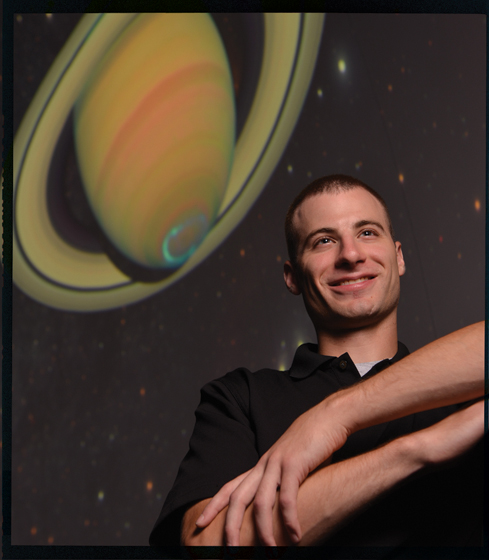 Fall 2012
Fall 2012|
Robert Marshall
Robert Marshall has stars in his eyes just about all the time. He began working at the Science Center’s Buhl Planetarium six years ago, initially part-time while earning his engineering degree at the University of Pittsburgh. And sometime between then and now, the 25-year-old dynamo fell hard for science—particularly astronomy. “I’ve worked just about everywhere at the Science Center, but to this day nothing really sparks my imagination like the planetarium, where I have access to the databases of real astronomers from around the world and I can navigate the universe,” Marshall notes. He now gets to share his passion for science on a full-time basis—part of the time as program development coordinator and all-around technology expert in the Buhl Planetarium, and part of the time as a workshop developer for Fisher Scientific Education, a division of the scientific instruments company that works directly with teachers. The company approached the Science Center two years ago about hiring one of its educators on an as-needed-basis to conduct science workshops for teachers and deliver science presentations at conferences. When asked to take on the dual role, the science zealot who devours scientific journals and runs triathlons in his spare time said yes—“as long as it didn’t take me away from the planetarium for too long.” When did you first feel that scientific spark?When I started working in the planetarium in my junior year at Pitt, I thought I’d take an astronomy class so I could teach a little bit better. That’s when it hit me. It’s beyond liking, and beyond loving, for me. It’s really in my blood. I know it’s cliché—you know, you find something you love and you never have to work a day in your life. To me it’s like that. It’s a passion. What’s your dream job?I think it would be working for NASA, doing astrophysics outreach with the public. I’m actually in the process of submitting for what’s called the Teacher Research Project through NASA. That’s where I would get to do real research with an actual PhD mentor. Is there one scientific puzzle you’d like to be a part of solving?We’re living in an exciting time. There has been a recent breakthrough in finding the missing puzzle piece in particle physics, the Higgs boson, which has eluded scientist for decades. It’s a fingerprint of the Higgs field, which is theorized to give all matter in the universe mass. If I could, I would want to participate in verifying the findings of those quantum [smaller than a proton] particles. Even more exciting, astrobiologists are confident in finding life right here in our solar system, maybe in our lifetime! Star Trek or Star Wars fan?Neither. You know why? It bothers me when I see a movie or TV show that is scientifically inaccurate. Okay, I can accept that Superman can fly—I’ll get over that. But wait a minute, he can accelerate to escape Earth’s gravity and traverse interstellar distances?! Now that I’m a teacher, I do appreciate those science-based movies a little more. Contact, Jurassic Park—just think about the young minds they’ve inspired to become scientists. That’s excellent! As an educator, have you had one of those “ah-ha” moments with a student?Oh, absolutely—many. I just got off the phone with a young man, he’s a high school student working on his senior project, and he called me with a number of questions about stars. He asked, ‘Why is it so important that we study stellar evolution?’ So I told him: You know that you come from stars, right? They create different atoms and then expel those elements out into the universe when burning out. Science tells us the iron in your blood comes from the center of massive stars. So you’re made up of star dust. There was dead silence on the phone. Then he said, ‘Wow, I get it! I never really understood that, but now it makes a lot of sense!’ Then he asked another question: ‘Why do you like what you do?’ And I told him: Because of conversations like this.
|
Ripped from the Headlines · The Advent of Modern Global · Drilling for Data · Perspective: Making Museums Matter · Director's Note · NewsWorthy · Science & Nature: Women’s Work · Artistic License: Personal Pop · First Person: A Feathered Face of Forest Fragmentation · The Big Picture
 |
Copyright © 2017 CARNEGIE Magazine. All rights reserved. |

